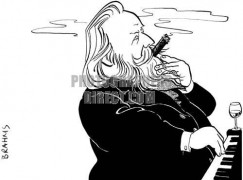150 years of German lament
mainBremen Cathedral is putting on a performance of Brahms’s German Requiem on April 10, 150 years to the day since the composer conducted its first performance there.
Paavo Järvi will lead the Deutsche Kammerphilhamonie Bremen, with soloists Matthias Goerne and Valentina Farcas.






Great event, great work.
Brahms wrote it rather early in his development, when hit very hard by the death of his mother, and a long time before he acquainted himself with the philosophy of Schopenhauer which convinced him of a non-spiritual, atheistic world view claiming that the best thing that could happen to man, was to never have been born. This partially explains B’s heavy drinking, unhealthy diet and 4th symphony.
Please, do expand on the 4th Symphony…
4th symphony: how does it feel to maintain a heroic stance in the face of nihilism. 1st mvt: nostalgic sadness struggles with willpower (in the development section, any idealism is given-up, but in the recapitulation and coda persistent willpower overcomes despair); 2nd mvt: a dirge mixed with hope, with an admonishing at the conclusion; 3rd mvt: unreal, forced laughter; 4th mvt: the definite prison of Schopenauerism – theme and variations circling around within the bars, incapable of finding an exit, but still the ego claims its existence.
Of course the music does not ‘depict’ all of this, but lets the listener experience how it feels if he/she goes through such states.
Apart from the much more accessible and beautiful musical language of Brahms, the character of the 4th is close to Shostakovich’s nihilism and heroism. In a psychological sense, the 4th is a very 20C work.
Bravo John! This rehearsal run through of second half of the 4th movement with Furtwangler’s and a combined London orchestra leaves no doubt as what the 4th could be about.
https://youtu.be/leYbb5KZYDg
Yes….. that was in the olden days when Brahms was mostly performed in a Wagnerized version: much too big orchestra, fat sound, slow tempi extra slow, massive tuttis extra massive, etc. Hence the critique that Brahms’ scoring was ‘muddy’. We know now that a lean string group gives a much better balance and transparancy and that he scored with a classical orchestra in mind..
Actually this goes a long way toward explaining why I feel the way I do about the 4th symphony…
@ John Borstlap: Very true about the forces but oddly enough Brahms himself was on the side of Huge — I think he wanted at least 200 singers in the Requiem and was happy to have fifty or a hundred more, same with orchestra size. It also shows in his insistence for At Least two harps, he was much happier with three.
The bones really show wonderfully in the piano reductions, two hands and four hands, the first of which Brahms made himself.
@buxtehude: maybe that was for the Requiem, but for the symphonies, concertos and the two serenades, B wanted a classical orchestra. The Requiem was his first exercise into grand orchestral sound but he seems to have recoiled from that later-on. The way the symphonies are scored, also show his idea of a classical balance – with too many strings, the woodwind drown.
@ John: Got it.
Fortunate people in Bremen! This work is the favorite among my favorites. There will be a performance in next March (2019!) in Maison Symphonique of Montreal, but the accompaniment is only an organ. I’m hesitant because I’m afraid to be disappointed.
Agreed. One of the best compositions of a fantastic and consistent composer, and one who is seriously misrepresented by the conventional historical narrative. Somehow they forget to mention what is best about him: He could write one hell of a good tune!
Totally agree.
I want to recommend to every single one of you who loves or likes Brahms the 800-page collection of his letters, selected and annotated by New York cellist Styra Avins and freshly translated by her husband Joseph Eisinger in what was clearly a labor of love for both of them: “Johannes Brahms — Life and Letters”, Oxford UP 2001 (the lightly-corrected paper edition). A scholarly work and therefore expensive to begin with and expensive used, few want to part with it.
This is one of the most interesting books I have ever read on any subject, even though Brahms hated writing letters (most begin with apologies for his procrastination as correspondent) and destroyed as many as he could later on, as his friends and collaborators died and the papers were returned to him, in the tradition of the time.
The secret is not only Ms Avins commentary, exactly enough without destroying mysteries or denying you room to draw your own conclusions, and the tone respectful, but her central intention in showing you how Brahms built his career as a composer against all odds. This probably would not have been possible without his 1853 encounter with the Schumanns and all that flowed from it, but much more was required.
It’s easy not to notice that almost alone among the great composers, Brahms was of working-class background where there was no automatic and comprehensive training available for talented boys, as in the church era. This book is the story of how he trained and prepared himself to compose and to keep at it over the course of a life time, always aware that he had to produce only masterpieces.
Even with the Schumann encouragement Brahms own mother considered her son’s ambition to compose as madness; he’d better stick to piano-playing: “You cannot live just by composing, even the greatest masters could not do that. …only the person who has money is respected… The artist is dependent entirely on the great and wealthy. The working class can do without it, must do without it. So the artist must seek friends among the rich. Oh, one doesn’t get through the world so easily and proudly, one has to put up with a lot and bow and scrape…” Well, he stuck to it.
It wasn’t until the Requiem, fifteen years after the first Schumann encounter, that the Germans realized a giant had appeared among them. The writing and producing of it is a good story too.
One happy discovery about this kind and generous man, was his heroic defense of Joachim’s wife Amalie, who the violinist tried to divorce and cast into outer darkness because of his own paranoid delusions of her infidelity. This book also corrects the unsupported, contentious and almost certainly wrong psychologising by Swafford on the subject oif Brahms’ wounded relationship to women and the reason he never married, which runs through that biography, marring it
Very interesting!
Thanks John.
And the irony of his mother’s fears was that from his mid-thirties, with the success of the Requiem, it was the high and mighty (at least the music lovers among them) abasing themselves before Brahms, dreaming up ever more tempting diversions, dinners, concerts, booze-fests, which Brahms had to resist in some measure if he was to keep writing.
He offered this as explanation for the gruff and often rude manner he took on in later. years. None of the greats achieved the fame and success of Brahms in their own lifetimes.
Excellent work Buxtehude. Too often has this great composer been damned with faint praise. My favourite anecdote about Brahms (and I really hope this is true) is about him sending a card to someone on which he had written the opening bars of the Blue Danube, and underneath, these words: “Sadly, not by Johannes Brahms.”
@ David: True, I think it was on Mrs. Strauss’s fan. B was the other kind of fan and there are a number of photos of the two together.
Brahms had previously published I think two collections of waltzes, these were very profitable, and Brahms appreciated the genre. (When B discovered Dvorak and set him up with his publisher Simrock, the order went out for waltzes, which became a great earner for the hungry Czech)
JB Have you heard Dave Allen’s Black cat story.
https://www.youtube.com/watch?v=GS3BZs5fx3Q
Would love to watch it but my computer has decided it contains inappropriate content.
Why did the BBC choose Denn alles Fleisch, es ist wie Gras for The Nazis a warning from History? Answer, it sort of resembled the mass rally at Nuremberg.
Brahms purposely omitted Christian dogma in it. In his correspondence with Carl Reinthaler, when Reinthaler expressed concern over this, Brahms refused to add references to “the redeeming death of the Lord”, as Reinthaler described it, such as John 3:16. In the Bremen performance of the piece, Reinthaler took the liberty of inserting the aria “I know that my Redeemer liveth” from Handel’s Messiah to satisfy the clergy.
Interesting…. there are always people who want to have their religious experiences conformed by literal reality instead of spiritual symbolism.
Lucky people in Bremen indeed. Just heard it last Thursday at St Thomas Church 5th Avenue with chorus of men and boys. BUT with two pianos, apparently a reduction done by the great Brahms himself. But, I must say it lost its grandeur, after all, he was such a great symphonist and orchestrator, the two pianos just seemed tinkly. I missed the wonderful visual aspect of the orchestra, especially the first few minutes when the violins (usually very busy) sit there doing nothing while the cellos and basses give the tune .
Exactly that is why I’m hesitating because of the organ version.
My feeling was just the opposite. I found the two piano version allowed the voices to be more prominent, and the text to be heard better. It was amazing to hear 10 year olds singing in perfect german
I wouldn’t refer to the Requiem of Brahms as an ‘early work’. As a composer Brahms was virtually born fully grown. And his 4th symphony is a miracle. Listen to Kleiber’s version of it. The same work, with him conducting the VPO, was found in the CD player of his car (he’d driven across from Munich) after he’d died a lonely death in that house in a Slovenian village. He was obviously fond and proud of it, in equal measure.
It’s ‘early’ only in a historic sense. Of course it is a fully mature work. I don’t know whether there exist ‘immature works’ by B at all.
Arguably he didn’t travel as long a road as, say, Bethoven. Yet his first two piano sonatas do strike me as rather immature when compared to his piano pieces op. 116-199.
Yes, agreed, they ramble a bit with empty pathos and very thin textures.
As compared to Beethoven, Brahms took a very different position wihtin the cultural climate of his time which was dominated by romanticism against which more classically-minded composers formed a rather small opposition (the later Schumann, Mendelssohn, Bruch, Raff, Dvorak, Franck etc.). In the 19C, ‘classical’ was a romantic notion nonetheless, a nostalgic look to the past, it was no longer the ‘real thing’ in relation to its cultural environment. But Brahms made a very personal version of it and as such was a kind of genius, but without ideological trumpet fanfares like Wagner. The Requiem is remarkable in that it revives baroque procedures.
It’s remarkable how poorly Bach was understood in the 2nd half of the 19th, despite the revival underway. It’s amusing to read what Wagner made of him, and on the other side Vienna’s leading critic and a Brahms partisan, who liked Bach even less.
Brahms, happily drawing inspiration and instruction from Baroque counterpoint, for the most part held his tongue but must have thought he was in an insane asylum. Yet even he would have been amazed at the centrality of Bach 150 years into the future. (Maybe less amazed if some future-guide had introduced him to Schoenberg, Stockhausen, Cage, Glass &c &c.)
I wonder whether it was the success of Brahms’ own music that helped bring this sea-change about, by creating familiarity with the procedures, preparing millions of pairs of ears to really hear, without being distanced…
As to your phrase “a kind of genius”, I would tweezer out the two middle words. There’s more to music than the shock of the new, isn’t that so?
Revives baroque procedures? Yes this is exactly what 21st century music needs. We are bored with atonal, polytonal, minimalism etc, time to start composing a decent tune for change.
@Cadogan: Unless you are being sarcastic, my own 2 cents is that No, bi-tonal, tri-tonal, polyonal is all Good — it’s Nielsen & Martinu, for example. It allows extra variety and compression, turns-on-dimes, without abandoning tonality. I dig it.
“Listen to Kleiber’s version of it” – which Kleiber, Erich or Carlos? Ah yes, Erich didn’t leave a recording of that work, so we have to stick with Carlos. But we are to assume that there is only one Kleiber anyway, aren’t we, and his first name starts with a C? I find it so, so irritating that people overlook the father just because the son was a textbook neurotic. In my opinion and for better or worse, the cult of Carlos Kleiber is nothing else than the veneration of the “Angel of the Odd”. It reminds me of what the widow of Joseph Gillain said about the cult of Jean Giraud… never be a teacher and mentor.
Rudi Kempe’s is miles better
” I find it so, so irritating that people overlook the father just because the son was a textbook neurotic.”
Thanks for pointing out why so many of us consider CK the pre-eminent conductor of his, or for that matter any other time. Of course it has nothing to do with the sheer magic of his work. We love him because he was nuts!
I honestly hadn’t noticed, just like I hadn’t noticed how much I must dislike dad’s work, because of course, we can’t like both. Well, that’ll clear some space on the hard drive!
@Buxtehude, Cadogan West is spot on all music not in the tonal domain is useless. That means most of last century’s stuff is in the bin.